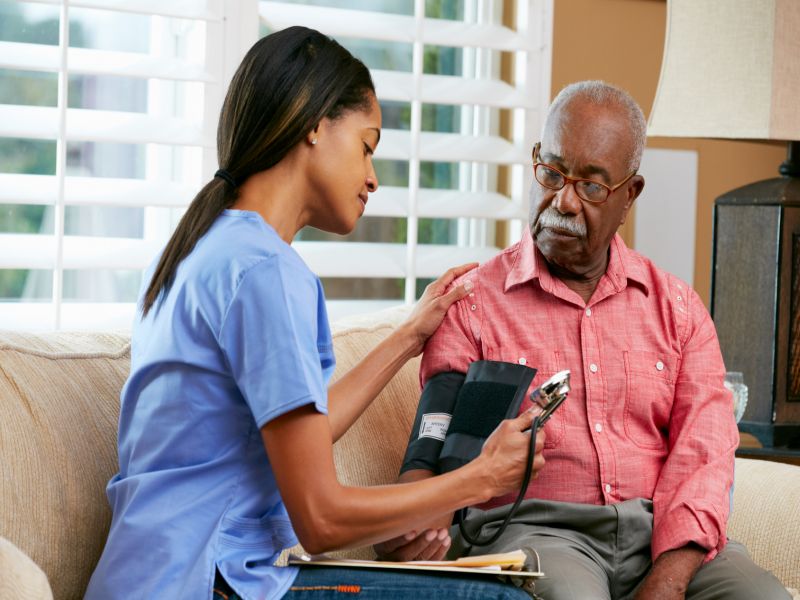High Blood Pressure Much More Deadly for the Poor
By Steven ReinbergHealthDay Reporter

WEDNESDAY, July 31, 2019 (HealthDay News) -- High blood pressure exacts a far greater toll on poor people than it does on affluent Americans, a new, national study finds.
The data from the clinical trial, which was designed to treat high blood pressure (hypertension), showed that poor people were half as likely to have their blood pressure controlled over the course of six years. They were also more likely to die, and to die of heart disease during the study period.
"We know racial disparities exist in this country, and other research by our group shows that they are worsening," said lead researcher Dr. Erica Spatz. She is an associate professor of medicine at Yale School of Medicine, in New Haven, Conn.
In a clinical trial with standardized protocols, one would expect the same results across all groups, she explained, "but this wasn't the case. There were systemic differences by socioeconomic region."
People living in poverty may have more stressors or unhealthy lifestyle behaviors that can increase blood pressure and counteract the effects of medication, Spatz noted.
"These participants were less likely to attend all study visits, so there may have been less of an opportunity to adjust the medication or promote other cardiovascular prevention strategies," Spatz added.
In fact, people living in poor areas had a 25% higher risk of dying, and a 25% higher risk of being hospitalized for and dying from heart failure than those in wealthier areas.
Poor people also had 86% higher odds of developing terminal kidney disease and were 30% less likely to have procedures to open blocked blood vessels after a heart attack or severe chest pain, the findings showed.
The report was published online July 31 in the Journal of the American Heart Association.
Dr. D. Edmund Anstey is a fellow in cardiology at Columbia University Medical Center in New York City. He said, "There is much more to quality of care than just the blood pressure protocol you're assigned to."
The disparities seen in blood pressure control may not be a factor of the medication, said Anstey, who co-authored an editorial that accompanied the study. Instead, it may be the result of complex factors that affect people living in poverty, such as diet, exercise and weight control.
"It also includes the relationship with the doctor, any language and culture barriers, all things that relate to the quality of care other than the treatment protocol," Anstey explained.
For the study, Spatz and her colleagues looked at a large trial that compared the effectiveness of three blood pressure drugs in maintaining blood pressure at less than 140/90 mm Hg.
Of all the patients in the trial, Spatz's team only looked at the 13,000 U.S. residents who took part. Of these, 8% lived in the lowest income sites and 38% in the highest income areas.
Participants in poor areas were more likely to be women, black or Hispanic, to have lower levels of education and to live in the South.
Poorer people tended to see a doctor less often than wealthier people, possibly due to lack of transportation or other factors that might have affected the results of the study, the researchers noted.
Spatz said, "We need to capture factors in the community that may undermine differences in response to cardiovascular interventions, and specifically to blood pressure-lowering therapy."
Kim Stitzel, a senior vice president in the Center for Health Metrics and Evaluation at the American Heart Association, said this study shows the importance of taking socioeconomic factors into account when evaluating a clinical trial.
"Although patients had equal access, in theory, to resources like medications, health care providers and other assets, patients may not access these resources equally in practice," she said.
Stitzel believes that other factors that affect behaviors need to be evaluated in trials.
"These broader factors cluster around social determinants of health, such as economic stability, neighborhood and built environments, education, and social and community context," Stitzel added.
More information
For more on blood pressure, head to the American Heart Association.

The news stories provided in Health News and our Health-E News Newsletter are a service of the nationally syndicated HealthDay® news and information company. Stories refer to national trends and breaking health news, and are not necessarily indicative of or always supported by our facility and providers. This information is provided for informational and educational purposes only, and is not intended to be a substitute for medical advice, diagnosis, or treatment.

